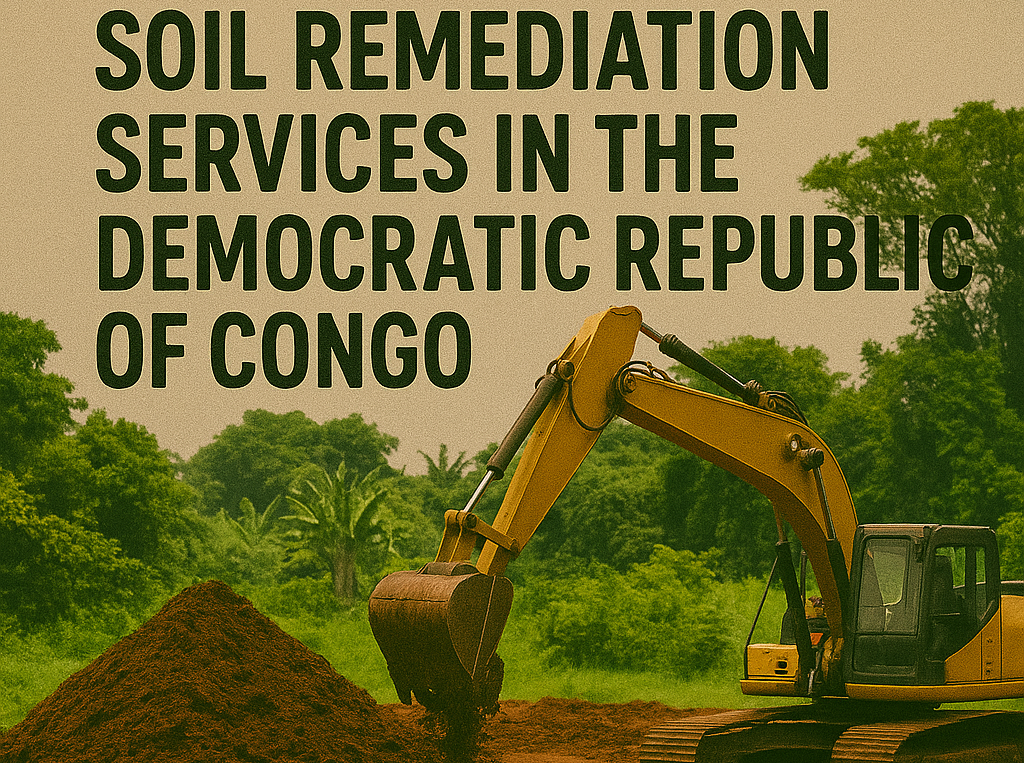Protecting Land and Water for a Sustainable Future
Introduction
The Democratic Republic of Congo, home to vast rainforests, fertile agricultural lands, and some of the world’s richest mineral reserves, faces a serious environmental challenge: soil and groundwater contamination. While mining, oil, and agriculture are vital for the country’s economy, decades of unregulated activity, industrial expansion, and rapid urban growth have left fragile soils and water reserves under strain. Pollution from mining tailings, oil leaks, and chemical-intensive farming now threatens food security, ecosystems, and public health.
At The Ground Water Company, we provide specialized soil remediation services across the DRC. Our mission is to restore contaminated land, protect aquifers, and support industries, municipalities, and communities in meeting environmental standards while contributing to the nation’s sustainable development.
What Is Soil Remediation?
Soil remediation is the process of cleaning up and restoring contaminated soil to make it safe for people, plants, and animals. It’s commonly used at sites where industrial activities, chemical spills, or improper waste disposal have polluted the ground.
In the DRC, the most common sources of soil contamination include:
- Petroleum hydrocarbons – from oil production, refineries, and transport pipelines
- Heavy metals – from mining activities, especially cobalt, copper, and gold extraction
- Chemical residues – from fertilizers, pesticides, and industrial waste disposal
- Salinity and nitrates – caused by poor irrigation practices and agricultural runoff in farming regions
Soil Contamination Challenges in the Democratic Republic of Congo
The Democratic Republic of Congo geography, economy, and reliance on natural resources create unique contamination risks:
- Mining Legacy – Cobalt, copper, and gold mining have left behind toxic metals and tailings that pollute both soil and aquifers.
- Oil & Industrial Activities – Oil operations and industrial hubs contribute to hydrocarbon leaks and chemical discharges.
- Urban Expansion – Rapid growth in Kinshasa, Lubumbashi, and Goma increases waste management challenges and landfill pollution.
- Agricultural Practices – Excessive pesticide and fertilizer use reduces soil quality and contaminates groundwater.
- Environmental Sensitivity – The Congo Basin rainforest and wetlands are ecologically fragile, making contamination especially damaging.
Our Soil Remediation Services in the Democratic Republic of Congo
At GWC, we provide tailored remediation strategies suited to the DRC’s complex environment:
- Site Assessment & Soil Testing
Soil sampling and analysis to identify contaminants
Risk assessment for human health and environment
Geotechnical surveys to understand soil structure
- Excavation & Disposal
Removal of contaminated soil
Transport to licensed disposal facilities
Landfill management or off-site treatment
3.In-Situ Remediation Services
Bioremediation (using microbes or plants)
Chemical oxidation/reduction
Soil vapor extraction
Phytoremediation
4.Ex-Situ Remediation Services
Soil washing
Thermal desorption
Stabilization
5.Water Treatment
Pump and treat systems
Permeable reactive barriers
Containment systems
6.Monitoring & Reporting
Post-remediation soil testing
Environmental monitoring
Regulatory reporting and documentation
Why Soil Remediation Matters in the Democratic Republic of Congo
Protects Groundwater Security – Essential for rural communities and rapidly growing cities
- Restores Land for Agriculture & Development – Ensures farmland and urban land remain safe for future use
- Supports National Development Goals – Aligns with the DRC’s vision for sustainable resource management
- Ensures Compliance – Meets environmental regulations and international standards for mining and industry
- Safeguards Public Health – Reduces exposure to heavy metals, toxins, and pollutants in farming and urban areas
Other Ground water Services We Provide in the Democratic Republic of Congo
In addition to soil remediation, GWC offers a full suite of groundwater solutions:
- Ground water exploration
- Ground water recharge
- Ground water contamination
- Dewatering solutions
- Flooding solutions
- Hydrological studies
- Ground water seepage
- Ground water remediation
- Flood risk assessment
Conclusion
The Democratic Republic of Congo’s rich natural resources are a source of both economic strength and environmental vulnerability. Mining, agriculture, and urban growth have created widespread soil and groundwater challenges that must be addressed for the country to achieve sustainable development. Protecting land and water is not just an environmental necessity, it is key to food security, public health, and long-term economic stability.


